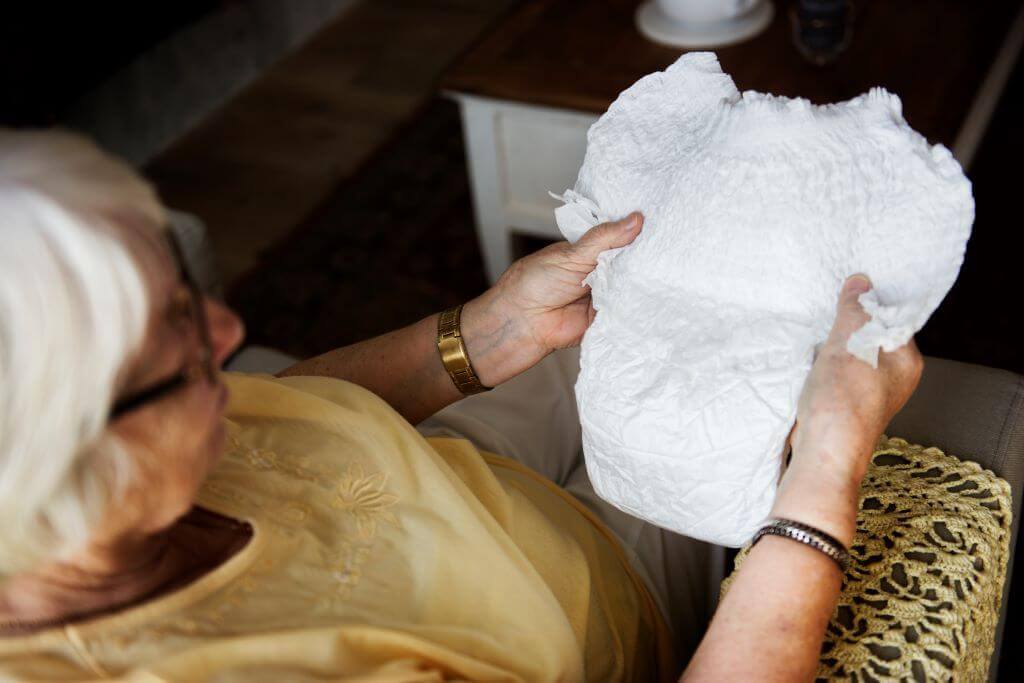Incontinence has become a very common condition in the last few decades. This is partly due to the advances in medicine that see people living longer, a better understanding and destigmatization of the condition and improved technology that has improved the effectiveness of incontinence management products.
Although incontinence is not an inevitable result of aging, it is significantly more prevalent among older people. Another affliction that affects older people is cancer. Estimates vary, but an American Cancer Society report states that almost two million new cases will be diagnosed in 2023.
Between a third and a half of all people will be diagnosed with cancer during their lifetime. Coupled with an incontinence incidence rate of around a quarter to a third of the adult US population, the chances of suffering from both are not insignificant. For caregivers, this can present a pretty daunting challenge. This article aims to provide caregivers with guidance and strategies for coping with people with incontinent cancer.
The Relationship Between Cancer and Incontinence
Living with cancer or incontinence is tough enough, but having both is a cruel twist of fate. Unfortunately, the two often go hand in hand. Cancer affecting the bladder, bowel, or other nearby organs can disrupt their normal function and lead to incontinence.
Certain cancers and treatments can weaken the pelvic muscles and cause stress incontinence when urine leaks due to abdominal pressure from coughing, laughing, or similar events. Cancer of the brain or spinal cord may also affect the nerves that control the bladder and the pelvic muscles. Fortunately, incontinence caused by cancer treatments often improves once the treatment is discontinued.
Managing Incontinence: Strategies and Techniques
Every cancer patient's experience with incontinence is different, so there is no one-size-fits-all care plan. Consult a healthcare professional to assess the patient's needs and create a tailored incontinence treatment plan. The program should consider strategies such as pelvic floor exercises, medication, dietary modifications, and bladder training.
In addition to a personalized care plan, some techniques and products can help manage incontinence. These include practicing good hygiene, using absorbent products for protection, and maintaining a regular toileting schedule. Assistive devices like catheters, furniture protecters and so on can all help to lighten the load for caregivers.
Choosing the Right Incontinence Management Solutions
There is a vast range of incontinence management products on the market nowadays, and choosing correctly may be a trial-and-error process. The severity of incontinence, mobility limitations and personal preferences all play a role in determining the right solution. Absorbent pads or liners may suffice for light leaks, while individuals with more significant incontinence may require adult briefs or underwear with higher absorbency. In some cases, catheters or collection devices may be necessary.
Using incontinence products correctly is essential. Follow the manufacturer's instructions for proper usage, including how to put on and remove the product. Regularly check for the right fit and make adjustments if necessary. Maintaining good hygiene by cleansing the skin and changing products regularly can help prevent irritation and infections.
For expert advice on adult diapers, urology devices, nutritional products and much more, call us at LL Medico. We have been in the business of senior care products for over 25 years, and we offer a comprehensive range of quality products at highly competitive prices. With our Autoship feature, you can set and forget your scheduled deliveries and leave it to us to ensure you’re always stocked up.
Importance of Hygiene and Skin Care
Cancer patients might be at a higher risk of skin irritation and infections as their immune systems may be compromised. Establish a proper hygiene routine, including regular bathing or showering, using mild cleansers specifically designed for sensitive skin, and thoroughly drying the skin after each cleansing. It may be helpful to use fragrance-free and hypoallergenic products to minimize the risk of irritation. Be gentle when cleaning the skin, and avoid excessive scrubbing or rubbing, which can lead to redness and irritation.
Change soiled incontinence products promptly or as directed by the product’s wetness indicator. Excessive moisture can cause skin breakdown, so ensuring the skin stays dry is crucial. Protective barriers, such as creams or ointments, can help create a barrier between the skin and bodily fluids. Regularly inspect the skin for any signs of redness, rashes or sores to identify potential issues early on and seek appropriate medical attention if you have any doubt.
Maintaining Emotional and Psychological Well-Being
Incontinence often significantly impacts a person's mental well-being. It leads to feelings of embarrassment, shame and a loss of control. As a caregiver, creating a safe and supportive environment where your loved one feels comfortable discussing their emotions and concerns is crucial. Encourage open communication, offer reassurance and remind them that incontinence is a common challenge that can be managed.
Good communication is critical. Listen attentively, validate their feelings, and provide reassurance that you're there to help. Empathy and understanding go a long way in alleviating emotional distress. Counseling or therapy can provide an outlet for them to express their feelings, address any underlying anxiety or depression and develop effective coping mechanisms. A mental health professional can offer guidance and support tailored to the unique needs and circumstances of the individual. Remember, there's no shame in asking for help when it comes to mental well-being.
Caregiver Resources and Support
As a caregiver, you don't have to navigate the challenges of incontinence or cancer alone. Many support organizations offer resources and guidance tailored explicitly to caregivers. These organizations can provide valuable information, connect you with support groups, and offer advice on managing caregiving's emotional and practical aspects.
Joining a caregiver support group can be incredibly beneficial. These groups provide a safe space to share experiences, gather tips and insights from others facing similar challenges, and find comfort in knowing you're not alone. It's an opportunity to build a support network, gain new perspectives, and discover coping strategies to make your caregiving journey more manageable.
The internet is a treasure trove of information, and numerous online resources and websites are dedicated to supporting caregivers of cancer patients with incontinence. Websites like the American Cancer Society and the National Association for Continence offer helpful articles, forums, and educational materials that can equip caregivers with valuable knowledge and tools to navigate the complexities of incontinence care.
Closing Thoughts
Caring for a cancer patient with incontinence requires patience, understanding, and a willingness to adapt to changing needs. By implementing the strategies and techniques outlined in this caregiver guide, we hope you can help alleviate the physical discomfort and emotional burden for yourself and your patient.
Remember, it’s okay to ask for help. And when you do, you’ll find many people willing to guide, support and motivate you. There are over 50 million caregivers in the US. You don’t need to fight this battle alone.







 855-422-4556
855-422-4556 Chat
Chat E-Mail
E-Mail Monday - Friday 9:00AM to 5:00PM EST
Monday - Friday 9:00AM to 5:00PM EST





 Shopping With LL Medico
Shopping With LL Medico
 855-422-4556
855-422-4556